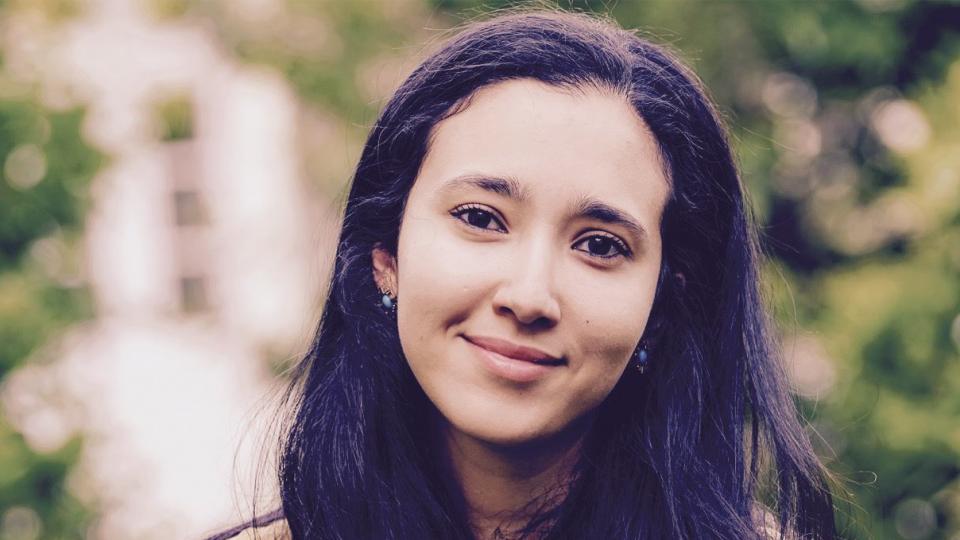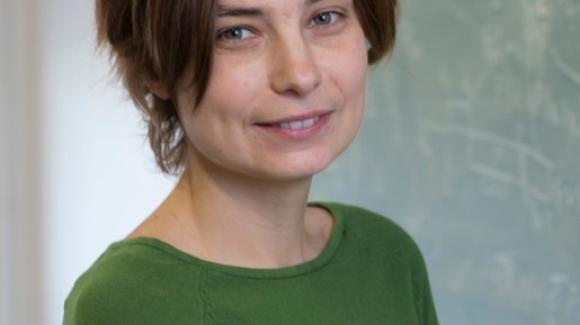
News
From physics to biology, from statistics to science popularization
Published on
21 September 2021
, updated on
28 May 2024
Image


Interested in mathematics from an early age, and after a preparatory class PCSI/PC (Physics, Chemistry and Engineering Sciences/Physical Chemistry), Meriem Bensouda Koraichi took the competitive exams for engineering schools.
A course at the interface of disciplines and worlds
Seduced by the ESPCI, she joined the school on the rue Vauquelin for its specificity in research, its interdisciplinary character and also for its link with innovation. She was attracted by the teaching formats, particularly the practical work and the tutoring. "Once a week, a researcher would come and explain his work to us. We were in groups of 5 or 6; it was easy to interact with him. It was a great opportunity to discover the world of research through this prism," says Meriem.
Gradually, her appetite for research developed. She completed two internships in the United States. The first was at IBM in California, in the field of experimental research in condensed matter; "there was an atmosphere of emulation and a lot of creativity, I really appreciated the freedom we had there."
The second in a more academic environment, in a Harvard laboratory. In Boston, she carried out experiments and simulations to study the diffusion and propagation of colloids (a suspension of one or more substances dispersed regularly in a liquid, forming a system with two separate phases).
I wanted to do more math and theory! Meriem Bensouda Koraichi
In her fourth year at the ESPCI, she chose to do her master's degree at the ENS, in fundamental physics: "I wanted to do more math and theory! At Rue d'Ulm, Meriem will study statistical physics and biophysics, which allow the prediction of macroscopic behaviors based on the understanding of microscopic configurations, to better interpret biological systems.
"I wanted to be able to explain my work to anyone."
Math, physics, but also biology, for which she sees more concrete applications: "I wanted to be able to explain my work to anyone, but also that it could echo essential health issues."
At the same time, the field of machine learning was expanding rapidly and attracted Meriem, who did her internship in a deep learning startup.
Between biology and computer science, Meriem blossoms by mixing disciplines and by working in a field she is increasingly passionate about. Familiar with the business world but open to a more academic career, Meriem is looking for a thesis between physics, machine learning and biology; she was then seduced by an offer of a thesis at the Laboratory of Physics of the ENS (LPENS), which brings together these three fields, under the direction of Aleksandra Walczak and Thierry Mora, two theoretical physicists.
Image

A thesis to predict the functioning of the immune system
Two years later, Meriem Bensouda has come a long way. First in the company of T lymphocytes (so named because of their maturation site in the Thymus), which form with B lymphocytes the adaptive immune system.
Meriem explains her thesis topic (entitled "Models of immune repertoire dynamics using a statistical biophysics approach") with great pedagogy.
"T and B lymphocytes have different dynamics: when they recognize an antigen (bacteria, virus, infected cell...), T lymphocytes will divide if they have an affinity with it. But unlike B lymphocytes which will mutate, T lymphocytes will keep the same genetic information", explains Meriem.
Because of this stability of T lymphocytes, Meriem and her colleagues will be able to work on population dynamics models.
But what is the interest for a physicist to study this T cell system? "T cells are recognized by their receptors, which interact with the pathogen. Each receptor is like a label for the cell; each type of receptor is expressed by a certain number of cells (receptor population): an A receptor will have 10 cells, a B receptor 30... All these cells will constantly interact with the very many pathogens present in our body and will more or less modify their population."
In fact, Meriem is trying to predict the populations of each receptor as a function of time; a very complex problem. Indeed, the immune system is efficient because it has a very large diversity to be able to fight all possible antigens. "There is a lot of talk about Covid now, but you have to know that we already had receptors that could interact with the virus, even before we were vaccinated. The vaccine, for example, will just expand that number of receptors," Meriem points out.
A complex problem and an unknown: the diversity of the immune system is not well known and we do not know how many receptors a human being has, even if some scientific articles estimate it at "10 to the 9th power".
Predicting this dynamic for a healthy individual is a new problem because, on the one hand, the statistical tools did not allow us to process these data, and on the other hand, because access to data has become more democratic in recent years: "for the past 10 years, we have had access to data that allows us to verify all the models, thanks to the new sequencing techniques.
In her PhD, Meriem enjoys the combination of data processing and theory on a biological system (physical models inspired by mathematical theories that predict ecological patterns): physics, computer science with machine learning, Meriem must interpret biologically the fruit of this machine learning.
But Meriem's work also has unexpected applications, for example in criminology: if the perpetrator of a crime has a monozygotic twin, his DNA is not sufficient to distinguish him from his twin. "Thanks to the immune system, it was proven that two different people could be distinguished, like an immune fingerprint. It was very interesting from an ethical point of view but also from a legal point of view."
Meriem also, like many researchers, worked on the Covid data, trying to discern which T cells respond to Sars-Cov 2.
Doing a thesis means boosting your creativity.
Two years after the beginning of her thesis, how does Meriem see it?
"The thesis is not a linear work: we advance on a question, then we will realize that we will need other knowledge to answer another question. We will then consolidate the bases to build a solid general culture of the field to be able to advance."
Meriem wanted to do a thesis to "deepen her knowledge in a field". This active learning approach is all the more demanding in a field that is at the crossroads of disciplines: "There is not much literature in quantitative immunology, so you have to draw inspiration from what is done in other fields.
Meriem is constantly seeking to exchange information and inspiration. Convinced that this is a major key to understanding, Meriem has, before starting her thesis, discussed a lot with PhD students, researchers, entrepreneurs but also employees or entrepreneurs.
A practice she still has: "at the beginning of my thesis, I wanted to understand the data I was working with. So I went to the labs to talk to doctors so that they could explain all the steps in their process and so that I could understand the potential errors at each experimental stage.
A posture of openness towards others that does not prevent a certain introspection: "the thesis is also time for oneself, one learns a lot about oneself, one's way of working, one acquires skills that are not only scientific. I compare this experience to starting a company. You have to manage yourself, know how to organize yourself. It's very psychological.
Meriem is thinking about creating her own company or developing her own project: "I have plans to create my own technology based on quantitative biology and machine learning. But I still give myself time!"
Representation as an engine of mediation and popularization
Alongside all these projects, Meriem is also developing scientific mediation approaches: "Next year, I will be giving introductory courses in physics to students from the Ecole Normale Supérieure. I will explain to them what statistical physics and biophysics are. For people who have no background in physics, it's a great challenge," Meriem enthuses.
With other PhD students, Meriem is also working on the organization of a conference of young biophysics researchers, Paris Biological Physics Community Day, which brings together young biophysics researchers in the Paris area to interact with each other.
Meriem will also volunteer by going to high schools in Seine Saint-Denis to encourage young people, especially women, to study science.
"I am very attached to the theme of representation. I know that seeing people who look like me and who do a certain type of work has made me want to do this work," Meriem concludes with commitment.



Be the first to review this item, please login or register.
Sign-in Register